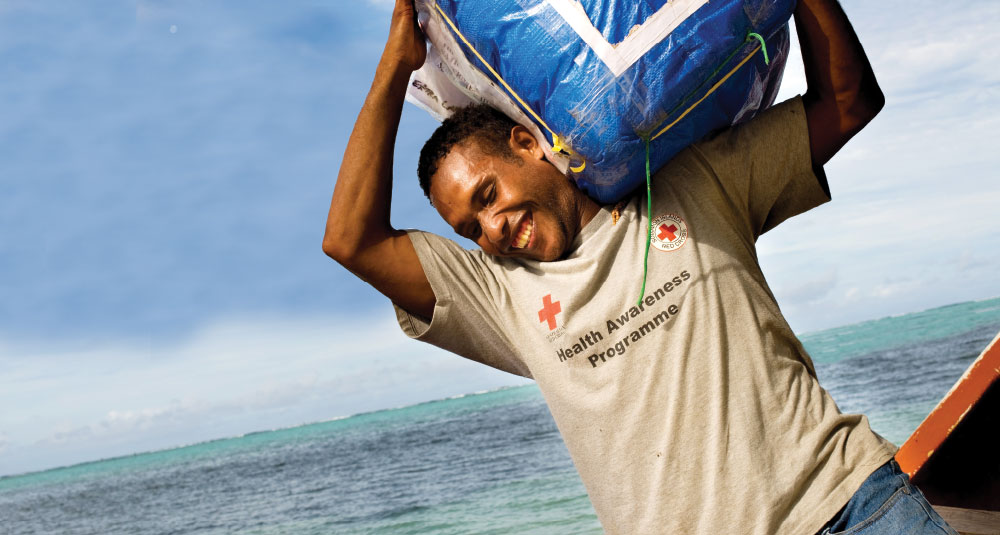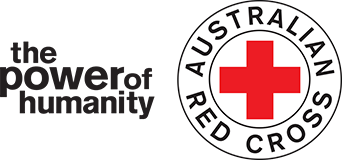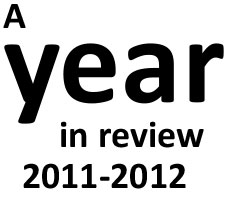Monitoring and evaluation
In March 2012 Red Cross held an ‘Evaluation Marketplace’ to showcase a number of evaluations and reviews from International Program and Australian Services. The objective was to share ideas and methodologies, as well as to approach evaluations and reviews as learning experiences. Below is a snapshot of some key program evaluations and their outcomes as part of our wider monitoring and evaluation work.

A Solomon Islands Red Cross volunteer delivers mosquito nets to isolated communities by boat. IFRC/Rob Few
Pacific Disaster Management Partnership
The Pacific Disaster Management Partnership is a ten-year initiative, supported by AusAID. Australian Red Cross works with Fiji, Solomon Islands, Vanuatu, Tonga, Samoa, Cook Islands, Federated States of Micronesia, Palau, Tuvalu and Kiribati Red Cross Societies to build capacity for disaster response and preparedness.
A mid-term review assessed whether the partnership achieved its objectives, and made recommendations for the next stages. This independent review collected data through case studies, stakeholder interviews and review of documents. It also used the qualitative approach of Most Significant Change, which involves participants collecting and systematically interpreting stories of change.
The review found that one of the most important single measures taken through the Partnership has been the funding of Disaster Management Officer positions. Good initial results were reported about strengthening community resilience. Volunteers are the backbone of Red Cross structure and response worldwide and the Partnership was found to enhance key contributions in this area.
Mongolia HIV/AIDS Response Program
The final evaluation of Australian Red Cross’ ten-year contribution to the Mongolian Red Cross Society HIV/AIDS Response Program was undertaken in mid-2011. The focus of the evaluation was on partner performance and project outcomes. Information was gathered from a variety of Mongolia-wide resources, internal reports and a survey based on the Global Alliance for HIV. Interviews with key stakeholders and focus group discussions with beneficiaries were also conducted.
There was evidence of behaviour change and increased capacity of Mongolian Red Cross due to the long running partnership with Australian Red Cross. In addition Mongolian Red Cross has taken a prominent role in the sector and appears to be one of the most significant organisations working in HIV prevention. From these foundations, the continuing contribution of Mongolian Red Cross in the HIV sector appears to be established and highly regarded at many levels of government and in the community.
Victorian Bushfire Recovery Unit
The Victorian Bushfire Recovery Unit (VBRU) began operations in April 2009 in response to the catastrophic Victorian bushfires in February of that year. Prior to this disaster, Red Cross had only carried out short term recovery activities focusing on immediate post impact outreach programs. The VBRU was the first formal recovery unit in Red Cross history.
The independent evaluation was undertaken by an external sector specialist, to assess a range of operational issues and to examine the program’s impact. Specifically, the evaluation examined the VBRU’s direct and indirect contribution to personal and community recovery, its program design and associated project planning tools, perceived quality of services and resources and level of volunteer involvement.
The findings were very positive, indicating that the work of the VBRU was innovative, exploratory and sensitive to the needs of affected communities. VBRU staff far exceeded any reasonable expectations of planning, management and operations.
Step Out – Youth at Risk of Reoffending
Red Cross commissioned the School of Law (Flinders University) to make a longitudinal evaluation of its innovative Step Out project, a mentoring initiative for young offenders who have been in contact with South Australia’s Youth Justice Directorate. The purpose was to track the program over 15 months to determine its success in helping participants to identify their personal goals, reconnect with their communities and minimise their future risk of reoffending.
The evaluation examined the variables which impact on the mentor/mentee relationship, the benefits of the program and ways to improve the program in the future. The evaluation findings were extremely positive. Mentoring made a substantive impact on mentees’ decision-making and capacity to plan for pro-social futures, as well as practical and immediate outcomes such as securing accommodation, job training or employment.
The evaluator found that mentors probably underestimated the nature and extent of their positive impact on mentees’ lives, and that mentees believed their journey toward integration into mainstream society had been made easier, better, or more probable, through their participation in the Step Out program.


Let us know what you think.
We welcome your comments and suggestions. Contact the editorial team at publications@redcross.org.au